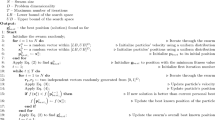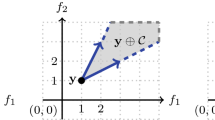Abstract
A new approximation algorithm is proposed for the problem of finding the minimum makespan in the job-shop scheduling environment. The new algorithm is based on the principle of particle swarm optimization (PSO). PSO combines local search (by self-experience) and global search (by neighboring experience), and possesses high search efficiency. Simulated annealing (SA) employs certain probability to avoid becoming trapped in a local optimum and the search process can be controlled by the cooling schedule. By reasonably combining these two different search algorithms, we develop a general, fast and easily implemented hybrid optimization algorithm; we called the HPSO. The effectiveness and efficiency of the proposed PSO-based algorithm are demonstrated by applying it to some benchmark job-shop scheduling problems. Comparison with other results in the literature indicates that the PSO-based algorithm is a viable and effective approach for the job-shop scheduling problem .
Similar content being viewed by others
References
Garey EL, Johnson DS, Sethi R (1976) The complexity of flowshop and job-shop scheduling. Math Oper Res 1:117–129
Brooks GH, White CR (1965) An algorithm for finding optimal or near-optimal solutions to the production scheduling problem. J Ind Eng 16:34–40
Greenberg HH (1968) A branch and bound solution to the general scheduling problem. Int J Oper Res 16:353–361
Balas E (1969) Machine sequencing via disjunctive graphs: an implicit enumeration algorithm. Int J Oper Res 17:941–957
Florian M, Trepant P, McMahon G (1971) An implicit enumeration algorithm for the machine sequencing problem. Manage Sci 1:B782–B792
Lageweg BJ, Lenstra JK, Rinnooy Kan AHG (1977) Job-shop scheduling by implicit enumeration. Manage Sci 24:441–450
Carlier J, Pinson E (1989) An algorithm for solving the job shop problem. Manage Sci 35:164–176
Applegate D, Cook W (1991) A computational study of the job-shop scheduling problem. ORSA J Comput 3:149–156
Brucker P, Jurisch B, Sievers B (1994) A branch and bound algorithm for the job-shop scheduling problem. Discret Appl Math 49:107–127
Perregaard M, Clausen J (1995) Parallel branch-and-bound methods for the job-shop scheduling problem. Working Paper, University of Copenhagen, Denmark
Martin PD (1996) A time-oriented approach to computing optimal schedules for the job-shop scheduling problem. Dissertation, Cornell University, New York 14853–3801
Adams J, Balas E, Zawack D (1988) The shifting bottleneck procedure for job shop scheduling. Manage Sci 34:391–401
Blazewicz J, Domschke W, Pesch E (1996) The job shop scheduling problem: Conventional and new solution techniques. Eu J Oper Res 93:1–33
Van Laarhoven PJM, Aarts EHL, Lenstra JK (1992) Job shop scheduling by simulated annealing. Int J Oper Res 40:113–125
Taillard E (1994) Parallel taboo search techniques for the job-shop scheduling problem. ORSA J Comput 16:108–117
Yamada T, Nakano R (1992) A genetic algorithm applicable to large-scale job-shop problems. In: Manner R, Manderick B (eds) Parallel problem solving from nature II, Elsevier Science, Amsterdam, pp 281–290
Aarts EHL, Van Laarhoven PJM, Lenstra JK, Ulder NLJ (1994) A computational study of local search algorithms for job-shop scheduling. ORSA J Comput 6:118–125
Dell’Amico M, Trubian M (1993) Applying taboo search to the job shop scheduling problem. Ann Oper Res 40:231–252
Nowicki E, Smutnicki C (1996) A fast taboo search algorithm for the job-shop problem. Manage Sci 42:797–813
Balas E, Vazacopoulos A (1998) Guided local search with shifting bottleneck for job-shop scheduling. Manage Sci 44:262–275
Kolonko M (1999) Some new results on simulated annealing applied to the job shop scheduling problem. Eu J Oper Res 113:123–136
Pezzella F, Merelli E (2000) A tabu search method guided by shifting bottleneck for the job shop scheduling problem. Eu J Oper Res 120:297–310
Aiex RM, Binato S, Resende MGC (2003) Parallel GRASP with path-relinking for job shop scheduling. Parallel Comput 29:393–430
Kennedy J, Eberhart R (1995) Particle swarm optimization. In: Proceedings of IEEE International Conference on Neural Network, pp 1942–1948
Eberhart R, Kennedy J (1995) A new optimizer using particle swarm theory. In: Proceedings of the Sixth International Symposium on Micro Machine and Human Science, Japan, pp 39–43
Shi Y, Eberhart R (1999) Empirical study of particle swarm optimization. In: Proceedings of Congress on Evolutionary Computation, pp 1945–1950
Kennedy J (1997) The particle swarm: social adaptation of knowledge. In: Proceedings of IEEE International Conference on Evolutionary Computation, pp 303–308
Muth JF, Thompson GL (1963) Industrial scheduling. Prentice-Hall, Englewood Cliffs, NJ
Eberhart R, Shi Y (2001) Particle swarm optimization: developments, applications and resources. In: Proceedings of IEEE International Conference on Evolutionary Computation, pp 81–86
Kirkpatrick S, Gelatt CD, Vecchi MP (1983) Optimization by simulated annealing. Science 220:671–680
Lawrance S (1984) Resource constrained project scheduling: an experimental investigation of heuristic scheduling techniques. Dissertation, Graduate School of Industrial Administration, Carnegie Mellon University, Pittsburgh, Pensylvania
Mattfeld D (1995) Evolutionary search and the job shop – investigations on genetic algorithms for production scheduling. Springer, Berlin Heidelberg New York
Author information
Authors and Affiliations
Corresponding author
Rights and permissions
About this article
Cite this article
Xia, Wj., Wu, Zm. A hybrid particle swarm optimization approach for the job-shop scheduling problem. Int J Adv Manuf Technol 29, 360–366 (2006). https://doi.org/10.1007/s00170-005-2513-4
Received:
Accepted:
Published:
Issue Date:
DOI: https://doi.org/10.1007/s00170-005-2513-4




